初中英语句型大全
- 格式:doc
- 大小:676.50 KB
- 文档页数:79
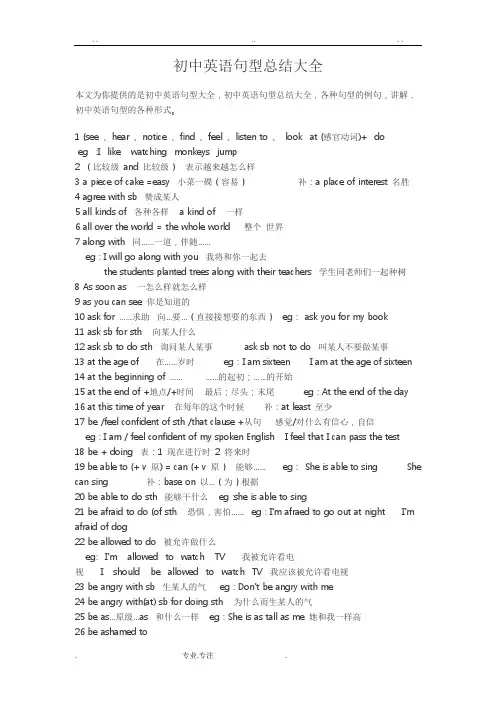
. . .. . . . 专业.专注 . 初中英语句型总结大全
本文为你提供的是初中英语句型大全,初中英语句型总结大全,各种句型的例句,讲解,初中英语句型的各种形式。
1 (see 、hear 、notice 、find 、feel 、listen to 、 look at (感官动词)+ do eg :I like watching monkeys jump 2 (比较级 and 比较级) 表示越来越怎么样 3 a piece of cake =easy 小菜一碟(容易) 补:a place of interest 名胜 4 agree with sb 赞成某人 5 all kinds of 各种各样 a kind of 一样 6 all over the world = the whole world 整个 世界 7 along with 同……一道,伴随…… eg : I will go along with you 我将和你一起去 the students planted trees along with their teachers 学生同老师们一起种树 8 As soon as 一怎么样就怎么样 9 as you can see 你是知道的 10 ask for ……求助 向…要…(直接接想要的东西) eg : ask you for my book 11 ask sb for sth 向某人什么 12 ask sb to do sth 询问某人某事 ask sb not to do 叫某人不要做某事 13 at the age of 在……岁时 eg:I am sixteen I am at the age of sixteen 14 at the beginning of …… ……的起初;……的开始 15 at the end of +地点/+时间 最后;尽头;末尾 eg : At the end of the day 16 at this time of year 在每年的这个时候 补:at least 至少 17 be /feel confident of sth /that clause +从句 感觉/对什么有信心,自信 eg : I am / feel confident of my spoken English I feel that I can pass the test 18 be + doing 表:1 现在进行时 2 将来时 19 be able to (+ v 原) = can (+ v 原) 能够…… eg : She is able to sing She can sing 补:base on 以…(为)根据 20 be able to do sth 能够干什么 eg :she is able to sing 21 be afraid to do (of sth 恐惧,害怕…… eg : I'm afraed to go out at night I'm afraid of dog 22 be allowed to do 被允许做什么 eg: I'm allowed to watch TV 我被允许看电视 I should be allowed to watch TV 我应该被允许看电视 23 be angry with sb 生某人的气 eg : Don't be angry with me 24 be angry with(at) sb for doing sth 为什么而生某人的气 25 be as…原级…as 和什么一样 eg : She is as tall as me 她和我一样高 26 be ashamed to . . .. . . . 专业.专注 . 27 be away from 远离 28 be away from 从……离开 29 be bad for 对什么有害 eg : Reading books in the sun is bad for your eyes 在太阳下看书对你的眼睛不好 30 be born 出生于 31 be busy doing sth 忙于做什么事 be busy with sth 忙于…… 32 be careful 当心;小心 be close to… 离…很近 33 be different from…… 和什么不一样 34 be famous for 以……著名 35 be friendly to sb 对某人友好 36 be from = come from 来自 eg :He is from Bejing He comes from Bejing Is he from Bejing ? Does he come from Bejing ? 37 be full of 装满……的 be filled with 充满 eg: the glass is full of water the glass is filled with water 38 be glad+to+do/从句 39 be going to + v(原) 将来时 40 be good at(+doing) = do well in 在某方面善长, 善于…… 41 be good for 对什么有好处 eg : Reading aloud is good for your English 42 be happy to do 很高兴做某事 43 be helpful to sb 对某人有好处 eg : Reading aloud is helpful to you 大声朗读对你有好处 Exercising is helpful to your bady 锻炼对你的身体有好处 44 be in good health 身体健康 45 be in trouble 处于困难中 eg : She is in trouble They are in tronble 46 be interested in 对某方面感兴趣 47 be late for = come late to 迟到 eg: Be late for class 上课迟到 48 be like 像…… eg : I'm like my mother 49 be mad at 生某人的气 50 be made from 由……制成(制成以后看不见原材料) 补:be made in 在…生产或制造 51 be made of 由……制成(制成以后还看得见原材料) 52 be not sure 表不确定 53 be on a visit to 参观 54 be popular with sb 受某人欢迎 补:be please with 对…感到满意 55 be quiet 安静 56 be short for 表**的缩写 eg: 陶 is short for 陶俊杰 57 be sick in bed 生病在床 58 be sorry to do sth be sorry for sb eg : I am sorry for you . . .. . . . 专业.专注 . 59 be sorry to hear that 60 be sorry to trouble sb eg : I am sorry to trouble you 61 be strict in doing sth 严于做某事 eg : He's strict in obeying noles 62 be strict with sb 对某人要求严格 eg: Some students are not strict with them selves 这些学生对自己不严格 63 be strict with sb in sth 某方面对某人严格 64 be supposed to do 被要求干什么 65 be sure 表确定 66 be sure of doing sth 对做某事有信心 eg: He is sure of winning I am sure of learning English well 67 be sure of sth 对做某事有信心 eg: I'm sure of my head (my teacher 我相信我的大脑(老师) 68 be sure that sth 对做某事有信心 eg: I'm suer that he can pass the test 我相信他
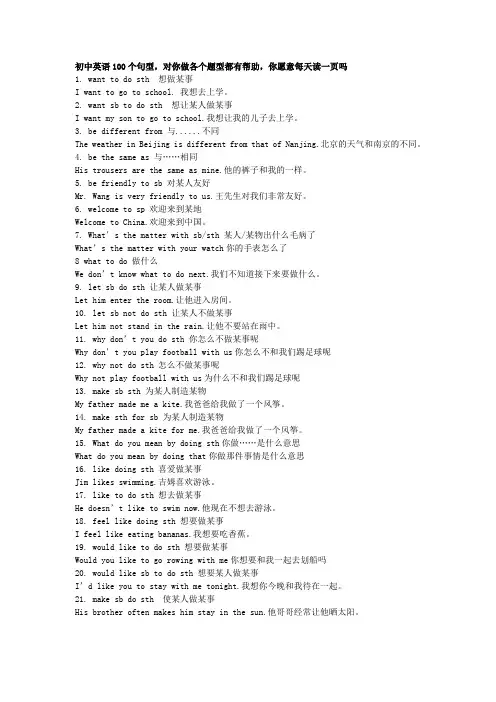
初中英语100个句型,对你做各个题型都有帮助,你愿意每天读一页吗1. want to do sth 想做某事I want to go to school. 我想去上学。
2. want sb to do sth 想让某人做某事I want my son to go to school.我想让我的儿子去上学。
3. be different from 与......不同The weather in Beijing is different from that of Nanjing.北京的天气和南京的不同。
4. be the same as 与……相同His trousers are the same as mine.他的裤子和我的一样。
5. be friendly to sb 对某人友好Mr. Wang is very friendly to us.王先生对我们非常友好。
6. welcome to sp 欢迎来到某地Welcome to China.欢迎来到中国。
7. What’s the matter with sb/sth 某人/某物出什么毛病了What’s the matter with your watch你的手表怎么了8 what to do 做什么We don’t know what to do next.我们不知道接下来要做什么。
9. let sb do sth 让某人做某事Let him enter the room.让他进入房间。
10. let sb not do sth 让某人不做某事Let him not stand in the rain.让他不要站在雨中。
11. why don’t you do sth 你怎么不做某事呢Why don’t you play football with us你怎么不和我们踢足球呢12. why not do sth 怎么不做某事呢Why not play football with us为什么不和我们踢足球呢13. make sb sth 为某人制造某物My father made me a kite.我爸爸给我做了一个风筝。
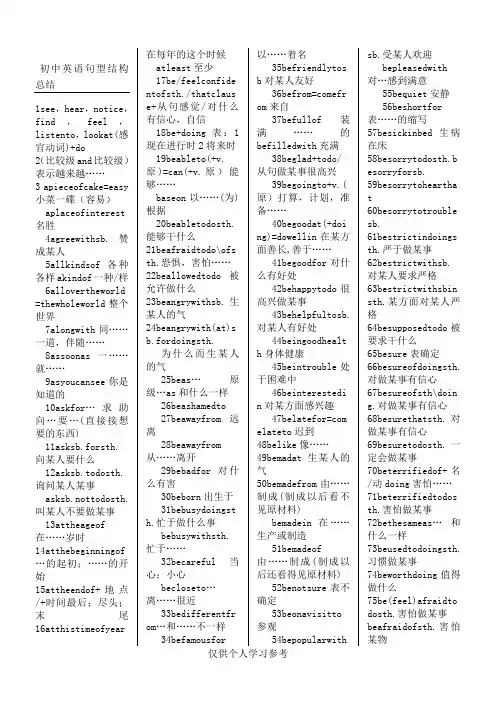
生病
被
对
一
名
和
值得
害怕
仅供个人学习参考
ttodo
始…
78be 两者之间
sb.
dsb.sth.么东西
om)和……都
84care 赶上某人某人闲谈
hsb.
定做某事
听报
(地
做某
有
某事
请某人
时
/
很大帮助某
希……怎么
仅供个人学习参考
样?
145if: whether 146if:
sb.think
些方面149
dv)最后150
什么在(north west西
下
代替
b.介绍我介绍
对于某样。
对某人样。
需
实义动情态动
、副)
一点……而
直给某人
提供
用电话
准时
=
一可数名
仅供个人学习参考
gin
职工作钱
付钱
rself .
into
g
th.相欢……
sth.
h.装着sth.
b.
幸
名
=
做方法
地方
太
足丛句
和
想
仅供个人学习参考
haveatry
小←→←→
倒着
某人dosth
多少间某人叫醒某事
坏
…
/doing
果……Whatif+
性动词otdo
one,。
one,另一
,
可用。
/物,剩
部用
当在
仅供个人学习参考。
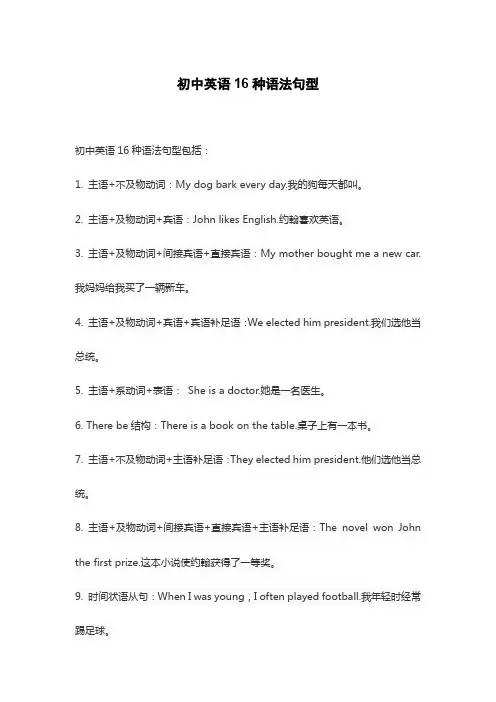
初中英语16种语法句型初中英语16种语法句型包括:1. 主语+不及物动词:My dog bark every day.我的狗每天都叫。
2. 主语+及物动词+宾语:John likes English.约翰喜欢英语。
3. 主语+及物动词+间接宾语+直接宾语:My mother bought me a new car.我妈妈给我买了一辆新车。
4. 主语+及物动词+宾语+宾语补足语:We elected him president.我们选他当总统。
5. 主语+系动词+表语:She is a doctor.她是一名医生。
6. There be结构:There is a book on the table.桌子上有一本书。
7. 主语+不及物动词+主语补足语:They elected him president.他们选他当总统。
8. 主语+及物动词+间接宾语+直接宾语+主语补足语:The novel won John the first prize.这本小说使约翰获得了一等奖。
9. 时间状语从句:When I was young,I often played football.我年轻时经常踢足球。
10. 条件状语从句:If it rains,we will stay at home.如果下雨,我们就待在家里。
11. 原因状语从句:Because we didn't have enough time,we couldn't finish the work.因为我们没有足够的时间,所以我们无法完成这项工作。
12. 目的状语从句:So that we can improve our English,we often listen to the English program.为了提高我们的英语水平,我们经常听英语节目。
13. 结果状语从句:He worked so hard that he passed the exam.他学习非常努力,因此他通过了考试。
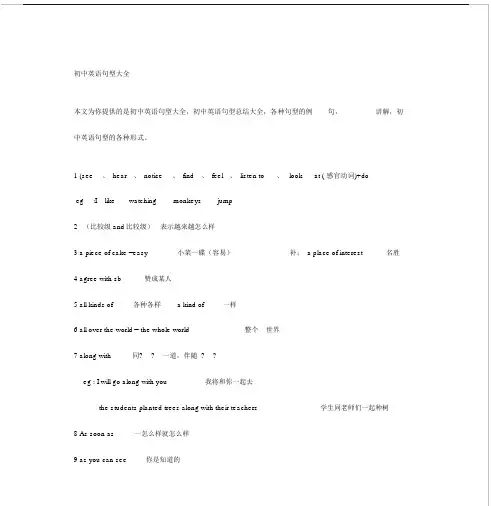
初中英语句型大全 本文为你提供的是初中英语句型大全,初中英语句型总结大全,各种句型的例 句, 讲解,初
中英语句型的各种形式。
1 (see 、 hear 、 notice 、 find 、 feel 、 listen to 、 look at ( 感官动词)+ do
eg :I like watching monkeys jump 2 (比较级and 比较级) 表示越来越怎么样
3 a piece of cake =easy 小菜一碟(容易) 补: a place of interest 名胜
4 agree with sb 赞成某人
5 all kinds of 各种各样 a kind of 一样
6 all over the world = the whole world 整个 世界
7 along with 同? ? 一道,伴随 ? ?
eg : I will go along with you 我将和你一起去
the students planted trees along with their teachers 学生同老师们一起种树
8 As soon as 一怎么样就怎么样
9 as you can see 你是知道的 10 ask for ? ? 求向助? 要? (直接接想要的东西) eg : ask you for my book 11 ask sb for sth 向某人什么
12 ask sb to do sth 询问某人某事 ask sb not to do 叫某人不要做某事
13 at the age of 在? ? 时岁 eg : I am sixteen I am at the age of sixteen
14 at the beginning of ? ? ? ? 的起初; ? ? 的开始
15 at the end of + 地点 /+时间 最后;尽头;末尾eg : At the end of the day 16 at this time of year 在每年的这个时候 补: at least 至少 17 be /feel confident of sth /that clause + 从句 感觉/对什么有信心,自信 eg : I am / feel confident of my spoken English I feel that I can pass the test 18 be + doing 表: 1 现在进行2时 将来时 19 be able to (+ v 原 ) = can (+ v 原) 能够 ? ? eg : She is able to sing She can sing 补: base on 以? (为)根据
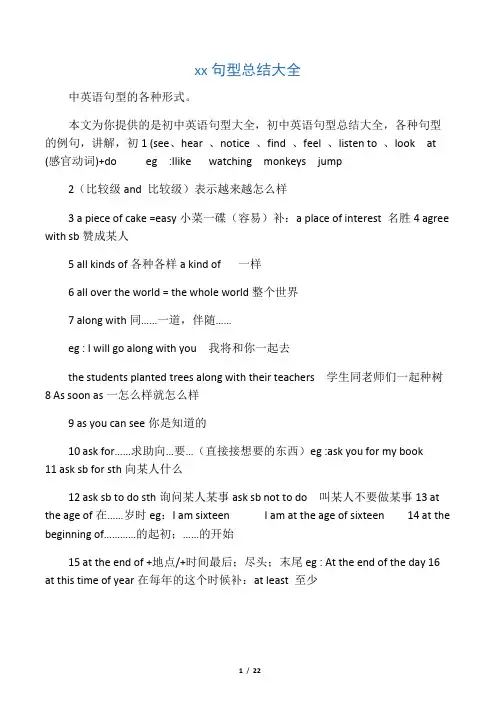
1 / 22 xx句型总结大全 中英语句型的各种形式。 本文为你提供的是初中英语句型大全,初中英语句型总结大全,各种句型的例句,讲解,初1 (see、hear 、notice 、find 、feel 、listen to 、look at (感官动词)+do eg :Ilike watching monkeys jump
2(比较级and 比较级)表示越来越怎么样 3 a piece of cake =easy小菜一碟(容易)补:a place of interest 名胜4 agree with sb赞成某人
5 all kinds of各种各样a kind of 一样 6 all over the world = the whole world整个世界 7 along with同……一道,伴随…… eg : I will go along with you 我将和你一起去 the students planted trees along with their teachers 学生同老师们一起种树8 As soon as一怎么样就怎么样
9 as you can see你是知道的 10 ask for……求助向…要…(直接接想要的东西)eg :ask you for my book 11 ask sb for sth向某人什么
12 ask sb to do sth询问某人某事ask sb not to do 叫某人不要做某事13 at the age of在……岁时eg:I am sixteen I am at the age of sixteen 14 at the beginning of…………的起初;……的开始
15 at the end of +地点/+时间最后;尽头;末尾eg : At the end of the day 16 at this time of year在每年的这个时候补:at least 至少 2 / 22
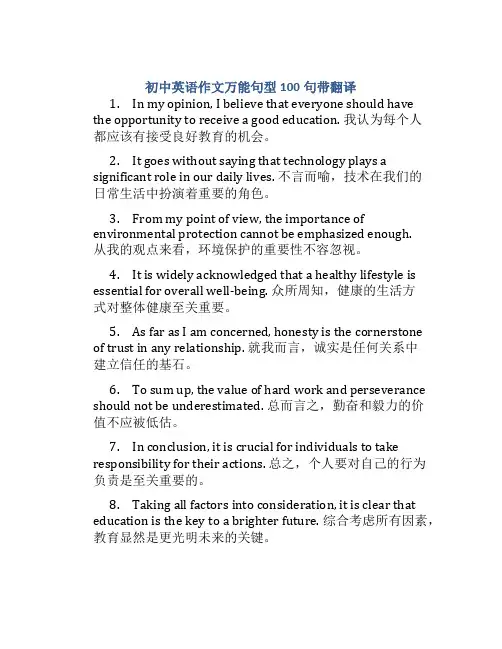
初中英语作文万能句型100句带翻译1.In my opinion, I believe that everyone should have the opportunity to receive a good education. 我认为每个人都应该有接受良好教育的机会。
2.It goes without saying that technology plays a significant role in our daily lives. 不言而喻,技术在我们的日常生活中扮演着重要的角色。
3.From my point of view, the importance of environmental protection cannot be emphasized enough.从我的观点来看,环境保护的重要性不容忽视。
4.It is widely acknowledged that a healthy lifestyle is essential for overall well-being. 众所周知,健康的生活方式对整体健康至关重要。
5.As far as I am concerned, honesty is the cornerstone of trust in any relationship. 就我而言,诚实是任何关系中建立信任的基石。
6.To sum up, the value of hard work and perseverance should not be underestimated. 总而言之,勤奋和毅力的价值不应被低估。
7.In conclusion, it is crucial for individuals to take responsibility for their actions. 总之,个人要对自己的行为负责是至关重要的。
8.Taking all factors into consideration, it is clear that education is the key to a brighter future. 综合考虑所有因素,教育显然是更光明未来的关键。
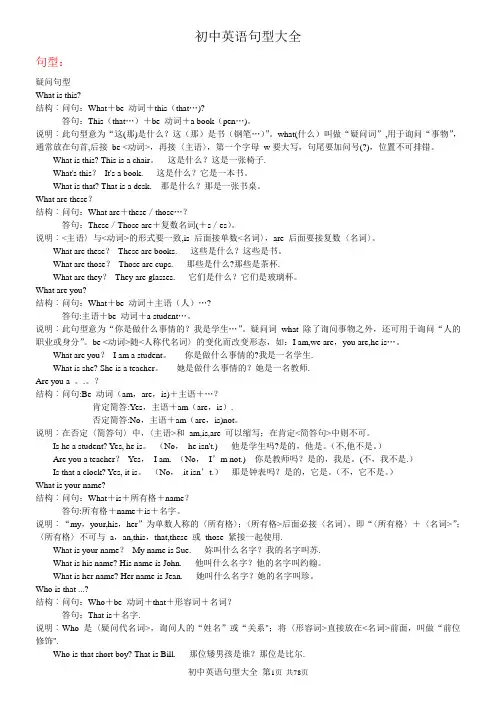
初中英语句型大全句型:疑问句型What is this?结构︰问句:What+be 动词+this(that…)?答句:This(that…)+be 动词+a book(pen…)。
说明︰此句型意为“这(那)是什么?这(那)是书(钢笔…)”。
what(什么)叫做“疑问词”,用于询问“事物”,通常放在句首,后接be <动词>,再接〈主语〉,第一个字母w要大写,句尾要加问号(?),位置不可排错。
What is this? This is a chair。
这是什么?这是一张椅子.What's this?It's a book. 这是什么?它是一本书。
What is that? That is a desk. 那是什么?那是一张书桌。
What are these?结构︰问句:What are+these/those…?答句:These/Those are+复数名词(+s/es)。
说明︰<主语〉与<动词>的形式要一致,is 后面接单数<名词〉,are 后面要接复数〈名词〉。
What are these?These are books. 这些是什么?这些是书。
What are those?Those are cups. 那些是什么?那些是茶杯.What are they?They are glasses. 它们是什么?它们是玻璃杯。
What are you?结构︰问句:What+be 动词+主语(人)…?答句:主语+be 动词+a student…。
说明︰此句型意为“你是做什么事情的?我是学生…”。
疑问词what 除了询问事物之外,还可用于询问“人的职业或身分”。
be <动词>随<人称代名词〉的变化而改变形态,如:I am,we are,you are,he is…。
What are you?I am a student。
你是做什么事情的?我是一名学生.What is she? She is a teacher。
- 总结. 初中英语句型大全
句型: 疑问句型 What is this? 结构︰问句:What+be 动词+this(that…)? 答句:This(that…)+be 动词+a book(pen…)。 说明︰此句型意为“这(那)是什么?这(那)是书(钢笔…)”。what(什么)叫做“疑问词”,用于询问“事物”,通常放在句首,后接 be ,再接,第一个字母 w要大写,句尾要加问号(?),位置不可排错。 What is this? This is a chair. 这是什么?这是一张椅子。 What’s this? It’s a book. 这是什么?它是一本书。 What is that? That is a desk. 那是什么?那是一张书桌。 What are these? 结构︰问句:What are+these/those…? 答句:These/Those are+复数名词(+s/es)。 说明︰与的形式要一致,is 后面接单数,are 后面要接复数。 What are these? These are books. 这些是什么?这些是书。 What are those? Those are cups. 那些是什么?那些是茶杯。 What are they? They are glasses. 它们是什么?它们是玻璃杯。 What are you? 结构︰问句:What+be 动词+主语(人)…? 答句:主语+be 动词+a student…。 说明︰此句型意为“你是做什么事情的?我是学生…”。疑问词 what 除了询问事物之外,还可用于询问“人的职业或身分”。be 随的变化而改变形态,如:I am,we are,you are,he is…。 What are you? I am a student. 你是做什么事情的?我是一名学生。 What is she? She is a teacher. 她是做什么事情的?她是一名教师。 Are you a ...? 结构︰问句:Be 动词(am,are,is)+主语+…? 肯定简答:Yes,主语+am(are,is)。 否定简答:No,主语+am(are,is)not。 说明︰在否定中,和 am,is,are 可以缩写;在肯定中则不可。 Is he a student? Yes, he is. (No, he isn’t.) 他是学生吗?是的,他是。(不,他不是。) Are you a teacher? Yes, I am. (No, I’m not.) 你是教师吗?是的,我是。(不,我不是。) Is that a clock? Yes, it is. (No, it isn’t.) 那是钟表吗?是的,它是。(不,它不是。) What is your name? 结构︰问句:What+is+所有格+name? 答句:所有格+name+is+名字。 说明︰“my,your,his,her”为单数人称的;后面必接,即“+”;<所有格>不可与 a,an,this,that,these 或 those 紧接一起使用。 What is your name? My name is Sue. 妳叫什么名字?我的名字叫苏。 What is his name? His name is John. 他叫什么名字?他的名字叫约翰。 What is her name? Her name is Jean. 她叫什么名字?她的名字叫珍。 Who is that ...? 结构︰问句:Who+be 动词+that+形容词+名词? 答句:That is+名字。 说明︰Who 是,询问人的“”或“关系”;将直接放在前面,叫做“前位修饰”。 Who is that short boy? That is Bill. 那位矮男孩是谁?那位是比尔。 - 总结. Who is that tall girl? That is Mary. 那位高女孩是谁?那位是玛丽。 Who is that fat man? He is my uncle. 那位胖男子是谁?那位是我叔叔。 Where is ...? 结构︰问句:Where+be 动词(am,are,is)+主语…? 答句:主语+be 动词+in the+名词…。 说明︰问句是“Where ...?”,简答时可用“In/On the+”。 Where is Sue? She is in her room. 苏在那里?她在她的房间里。 Where are your books? On the desk. 你的书在那里?在书桌上。 Where is your mother? She is in the kitchen. 你妈吗在哪里?她在厨房里。 Are you V-ing ...? 结构︰Am(Are,Is)+主语+现在分词…? 说明︰此句型意为“(人,物)正在…吗?”。这一转换的三要素是:be 移到句首;改为大写;句尾用问号。 Is Mary sleeping? 玛丽正在睡觉吗? Are you reading a book? 你正在看书吗? Is the dog playing? 小狗正在玩耍吗? What are you doing? 结构︰问句:What+am(are,is)+主语+现在分词? 答句:主语+am(are,is)+现在分词…。 说明︰“(人)正在做什么?(人)正在…”。注意:的动词只能用原形,不可造行式>;表示“瞬间产生”的动作的,如 sit down,stand up,不可造。 What am I doing? You are reading a book. 我正在做什么? 你正在阅读一本书。 What are the girls doing? They are singing. 姑娘们正在做什么? 她们在唱歌。 What is Bill writing? He is writing a letter. 比尔在写什么? 他在写一封信。 How old are you? 结构︰问句:How old+be 动词+主语(某人)? 答句:主语(某人)+be 动词+year(s) old。 说明︰此句型意为“某人几岁?某人是…岁”。该句型中,要用 how,不可用 what;且 be (am,is,are)要和后面的(某人)配合;答句中的“year(s) old”可以省略。 How old are you? I am twelve (years old). 你几岁?我十二岁。 How old is your sister? She is thirteen years old. 你的姊妹几岁?她十三岁。 How old is John? He is one year old. 约翰几岁?他一岁。 What time is it? 结构︰问句:What time is it? 答句:It is+数字+o’clock。 说明︰此句型意为“现在是几点钟?现在是…点钟”。问句中 what 当,修饰后面的 time;time 当时间解时,只能用单数,不可用复数。 What time is it? It is ten o’clock. 现在是几点钟?现在是十点钟。 What time is it? It is six o’clock. 现在是几点钟?现在是六点钟。 What time is it? It is nine o’clock. 现在是几点钟?现在是九点钟。 Do you + V ...? 结构︰问句:Do/Does+主语+原形动词…? 肯定简答:Yes,主语+do/does。 否定简答:No,主语+don’t/doesn’t。 说明︰肯定句中,如有一般(speak,work,teach…),则在句首加 do 或 does,并将一般改为原形(不加s或es),即构成。 Do you speak English? Yes, I do. (No, I don’t.) 你讲英语吗?是的,我讲英语。(不,我不讲英语。) - 总结. Does she have a cat? Yes, she does. (No, she doesn’t.) 她有一只猫吗?是的,她有一只猫。(不,她没有一只猫。) Do they work in office? Yes, they do. (No, they don’t.) 他们在办公室里工作吗?是的,他们在办公室里工作。(不,他们不在办公室里工作。) What time do you + V ...? 结构︰问句:What time+do/does+主语+原形动词…? 答句:主语(某人)+一般动词…+时间。 说明︰此句型意为“某人几点做某事?” do 或 does 的选择依而定,若为第三人称单数,用 does;其它用 do。 What time do you get up? I usually get up at six. 你几点起床?我通常六点起床。 What time does he go to bed? He usually goes to bed at ten.他几点就寝?他通常十点就寝。 What time does your class begin? It begins at eight-ten. 你的课几点开始?八点十分开始。 What day is today? 结构︰问句:What day is today? 答句:It’s+Sunday/Monday/…。 说明︰此句型意为“今天是星期几?今天是星期日/星期一/…。”it 可用于指“星期的名称”,但 this或 that 不可以;一星期七天的名称,都是,开头的首字母要大写,前面不加。 What day is today? It’s Sunday. 今天是星期几?今天是星期日。 What day is today? It’s Wednesday. 今天是星期几?今天是星期三。 What day is today? It’s Saturday. 今天是星期几?今天是星期六。 How many N are there ... 结构︰问句:How many+复数名词+are there in/on+名词? 答句:There is/are+单数(复数)名词+in/on+名词。 说明︰此句型意为“在某处有多少…?在某处有…。”该句型中,many 修饰复数;又因本句型是 句>,故用 are there,不可用 there are。 How many seasons are there in a year? There are four seasons in a year. 一年有几个季节? 一年有四季。 How many days are there in a week? There are seven days in a week. 一星期有几天? 一星期有七天。 How many lessons are there in this book? There are twelve lessons in this book. 这本书里有几课? 这本书里有十二课。 How many ... do you have? 结构︰问句:How many+复数名词+do/does+主语+have? 答句:主语+have/has…+复数名词+…。 答句:主语+don’t/doesn’t have…+复数名词…。 说明︰“How many”后面接复数,复数的前面可用 many,a lot of,a few,some,few,any,no 等修饰。 How many books do you have? I have a lot of books. (I don’t have any books.) 你有几本书? 我有许多书。(我没有书。) How many sweaters do you have? I have three sweaters. (I don’t have any sweaters.) 你有几件毛衣? 我有三件毛衣。(我没有毛衣。) How many friends does she have? She has a lot of friends. (She doesn’t have many friends.) 她有几个朋友? 她有许多朋友。(她没有许多朋友。) How much ... do you have? 结构︰问句:How much+单数不可数名词+do/does+主语+have? 答句:主语+have/has…+单数不可数名词。 答句:主语+don’t/doesn’t have…+单数不可数名词。